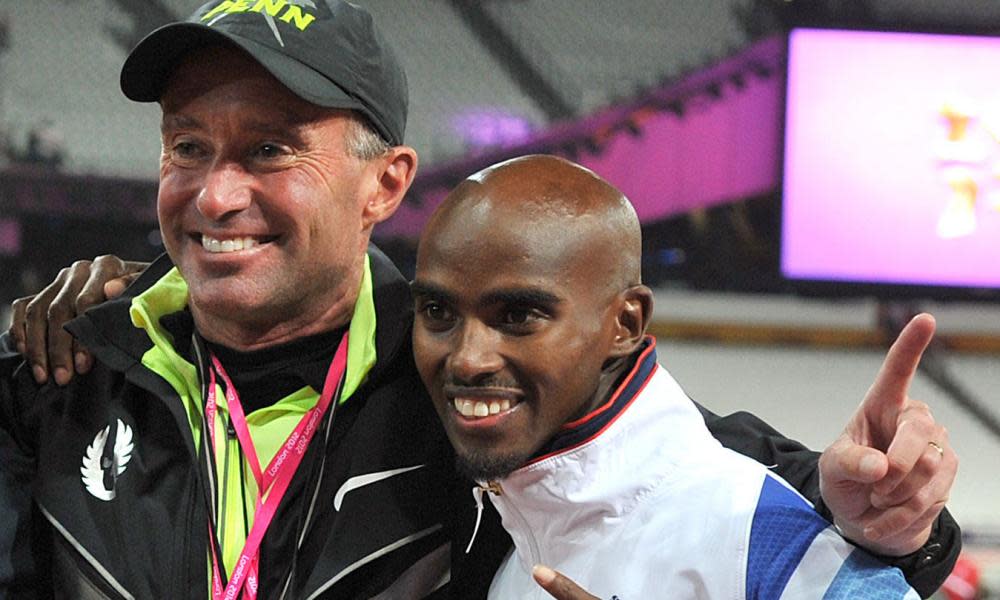Alberto Salazar and Mo Farah still have many questions to answer

The last time I spoke to Alberto Salazar, in a hotel lobby in Beijing, he offered some simple financial advice. “You should put your money on me being cleared,” he said, smiling. “It’s a winning bet.” That was in August 2015, in the midst of a blizzard of allegations and an investigation by the US Anti‑Doping Agency against him. Yet 18 months later he remains in limbo, neither damned or saved, still awaiting his fate. And there, right beside him, stands Sir Mo Farah and British Athletics.
Who would have predicted this in June 2015, when the allegations against Salazar first surfaced on the BBC’s Panorama? Depending on one’s point of view, this shows either commendable faith or staggering misjudgment on the part of Farah and British Athletics. The accusations are not insubstantial. Salazar has faced a rap sheet of potential violations – including giving Galen Rupp testosterone when he was 16 – and now it has been suggested that he ignored the warnings from a UK Athletics doctor not to prescribe Farah vitamin D or calcitonin in high doses in 2011 because of a medical condition.
Yet still he evades all attempts to put him down for the count. On Sunday night he was dismissive of the Sunday Times’s latest story, saying the newspaper had “simply recycled old allegations that have been refuted almost two years ago” and again insisting: “I believe in a clean sport and a methodical, dedicated approach to training.”
One might not believe him and even his friends and admirers would admit that he is a coach who operates in most of the 50 shades of grey. But, as of yet, Usada has not been able to nail him.
Farah must realise that he risks suffering reputational damage by sticking with Salazar. He was told as much by the UK Athletics chairman, Ed Warner, nearly two years ago. But still he stays with the man who made him an almost unbeatable mid-distance champion. One can see why. Before Farah moved to the US in late 2010 he hovered just under super-elite level, finishing sixth in the 5,000m at the 2007 world championships and seventh in the same event in 2009. Since then he has won nine gold medals and a silver at Olympics and world championships. Even at 33 his powers appear undiminished: in truth he could have won a medal at every distance from 1500m to marathon at the Rio Olympics.
On Sunday he again protested his innocence, just as he has done since the Salazar allegations surfaced. But this time his statement had sharper teeth: “I am unclear as to the Sunday Times’s motivations towards me but ... it’s entirely unfair to make assertions when it is clear from their own statements that I have done nothing wrong.”
Here Farah is on dangerous ground. It is not unreasonable to press him harder given Usada’s investigation into Salazar and his previous evasiveness over his relationship with the Ethiopian coach Jama Aden, who is being investigated by the Spanish anti-doping agency. He should look at how Bradley Wiggins has been treated after the revelations that he used a therapeutic use exemption to realise that he is not alone.
Meanwhile there are also questions for UK Athletics in all this. In 2015 it set up a performance oversight management group to investigate its relationship with the Nike Oregon Project, led by Jason Gardener. The former sprinter is well liked but he is not a skilled investigator. One would not ask Elliot Ness to run the 100m.
UK Athletics will also be asked, just as it was in 2015, whether it has got too close to Salazar in the pursuit of medals. From 2012 to 2015 the performance director, Neil Black, used to travel at least six times a year to the Nike Oregon Project, while the head of endurance, Barry Fudge, was also a regular visitor. Both men would deny such charges. As Black puts it: “Alberto is absolutely brilliant. He is a genius. And he is one of the best people to work with that I have ever come across.”
He is not the only one who thinks that way. Bob Williams, a running coach who has known him for more than four decades, says there is no one better at training endurance athletes. “Alberto’s skill is to make really good athletes even better,” he says. “There’s a fine line between pushing them to their limits and avoiding injury and Alberto is a master at it.” Senior British Athletics coaches also pinpoint Salazar’s uncanny ability to select the right final hard workout before a major race to get them to perform on the day. Some, though, are far more sceptical.

 Yahoo News
Yahoo News 
